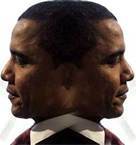Reihan Salam writes persuasively that Obama demonstrates a trait common to well-regarded rulers from both recent and ancient history: an ability to convince allies he is still on their side even when he makes decisions that they disagree with. He concludes a long post by saying:
Perhaps sphinxlike leaders make the strongest leaders — allies see in them exactly what they want to see, thus giving the leader in question considerable freedom of action. Ronald Reagan’s political success arguably derived from the fact that his conservative supporters saw him as a loyalist and his moderate supporters saw him as pragmatic and flexible when necessary. In a related vein, Barack Obama commands the allegiance of a large number of base liberals, moderates, and culturally conservative minority voters because members of each of these potentially clashing constituencies see him as one of them.He earlier notes that Obama was able to run ads in local markets that contradict some of his stated positions and would seem likely to offend his allies...and he did not suffer any criticism or loss of support from his core. For example, he ran some ads in Ohio that implied he was more supportive of coal than Romney, but environmentalists didn't blink. If Romney had similarly run an ad in Ohio expressing support for the auto bailout or for raising taxes on the wealthy, there's no way his political allies would have accepted it in silence.
How does Obama get away with seemingly pandering to win support like this? Salam's answer, in part, is that his allies either believe he doesn't mean it, or that he is simply making necessary compromises with political reality, moving the country as far in their direction as is possible. Another way of thinking about this is to say that, for many of his supporters, who Obama is matters more than what he says, or even what he does. And another way of thinking about it is that Obama has a brand that is deep and resonant enough to say seemingly contradictory things.
There are a few lessons marketers can learn about brand-building from Obama's achievement:
- Be really clear about what you stand for, and have an argument for how your actions reflect your beliefs. Although many conservatives felt like Obama was disdainful and combative, he steadfastly stuck to his brand, which was the reasonable compromiser, the "adult in the room". It might have made his opponents want to throw a rock through their TVs, but by fighting to preserve that brand he was able to hold on to moderate voters despite widespread disappointment with the economy. Similarly, a brand that changes what they stand for every time a new competitor enters the market or the environment changes loses its credibility and coherence.
- Understand how far your brand can stretch. Obama would never have been able to appeal to Tea Party types, and wisely didn't try. He found places where he could tweak his messages to appeal to low-attention voters or the undecided without violating his brand.
- Identify the marginal opportunities using "Big Data". Writers have commented at length on how savvy the Obama campaign was in micro-targeting different slivers of the population. Often, they say that Obama was marketed like a consumer product. But a lot of consumer brands could learn from Obama's ability to address regional issues and go beyond broad ethnic and gender categories. Hispanics aren't just Hispanics, they are also women, and parents, and employees. Obama's campaign seemed to appreciate that people have composite identities, and they had the data (and budget) to act on it.
If you want to build a mass market for something, whether it is a politician or a product, it is unlikely that everyone you're trying to convert wants the same thing. So your brand has to have room for a lot of different facets or points of emphasis. Ultimately, a strong identity actually creates more room for flexibility in messaging, because your audience is willing to forgive individual messages that don't connect with them if they are invested in the brand. And if your competitors hear your diverse messages and call you two-faced? You should probably take it as a compliment.

I've nominated you for the Very Inspiring Blogger award. You rock! Learn more about this award here:
ReplyDeletehttp://oedaday.wordpress.com/2012/12/13/flattered/